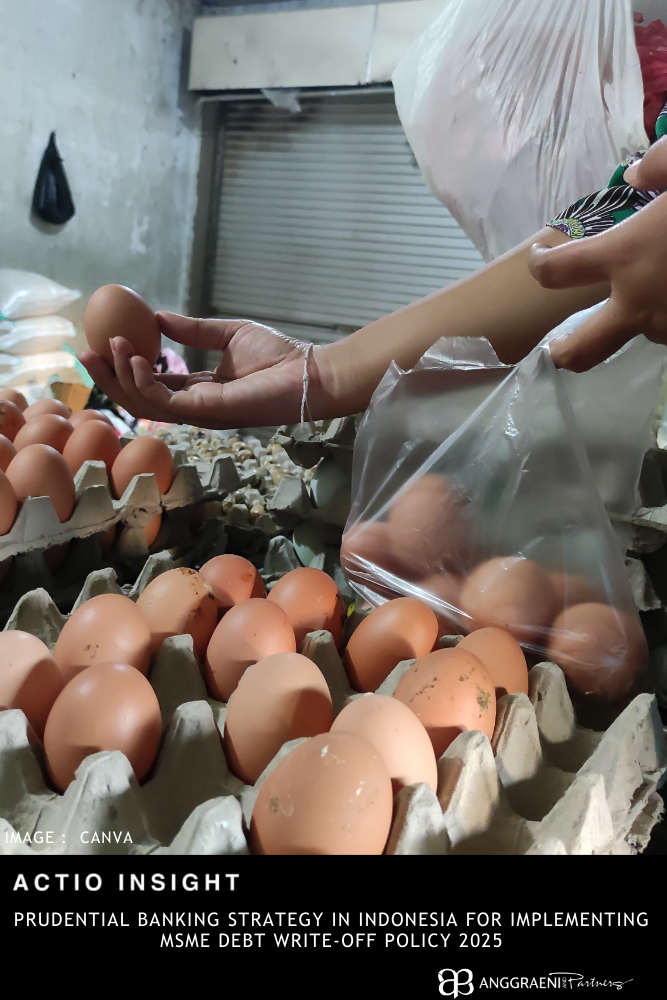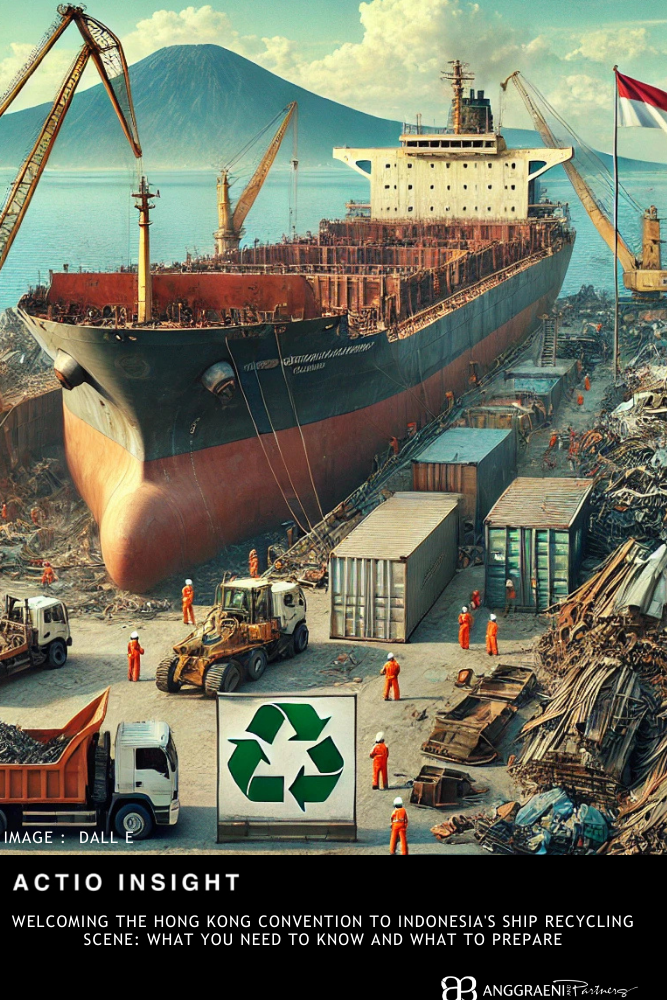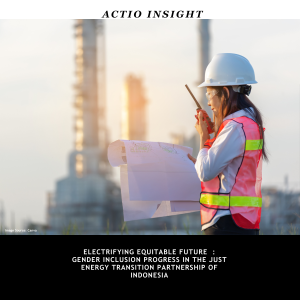ELECTRIFYING EQUITABLE FUTURE : Gender Inclusion Progress in the Just Energy Transition Partnership of Indonesia
by Setyawati Fitrianggraeni, Muhammad Soufi Cahya Gemilang, Sri Purnama
INTRODUCTION
Just energy transition is the central aspect of the global commitment to transition from fossil fuel to renewable energy. The Paris Agreement stated that the process of energy transition must consider the creation of decent work and quality jobs following each nation’s priorities.[1] This necessitates the principle of Leave No One Behind, whereby to decarbonize the economy, a country needs to provide quality replacement jobs for the former fossil fuel workers, ensure that the transition would tackle energy inequality in a given country, and expand participation to every member of the society. Therefore, inclusivity becomes the central aspect of the transition.
One of the main aspects of inclusivity in the just energy transition is gender inclusivity. In this case, three main points of gender inclusivity need to be highlighted. Firstly, gender inclusivity in the renewable energy workforce. This includes the issues surrounding women’s participation in STEM (Science, Technology, Engineering & Mathematics) sectors, creating a safe workplace for women in the energy sectors, and expanding new gender-inclusive job opportunities in the renewable energy sectors. Secondly, gender inclusivity in renewable energy initiatives. Specifically, this refers to gender inclusivity in initiatives for renewable energy provision and innovation. Lastly, the direct and indirect impacts of energy transition to gender inclusivity in other sectors, such as the impacts of renewable energy initiatives on inclusive rural development and gender inequality in economic development.
In addressing gender inequality in energy transition, gender inclusivity has been adopted as one of Indonesia’s main priorities in developing its energy transition plan, also known as the Just Energy Transition Partnership (JETP). The JETP is a global financing mechanism designed to aid coal-dependent countries to transition into renewable energy with the “No One Left Behind” (NOLB) principle.[2] This article aims to review the progress of gender-inclusive development under the energy transition policies in Indonesia. The article used the abovementioned gender inclusion framework to review the progress. To conclude, the article provides a way forward for Indonesia to achieve its gender-inclusive just transition.
OVERVIEW OF THE JUST ENERGY TRANSITION PARTNERSHIP (JETP)
JETP represents a significant international cooperative effort, inaugurated during the G20 Summit in Bali.[3] It is not merely a theoretical framework but a tangible agreement to propel Indonesia towards a sustainable energy future. The partnership is designed to streamline Indonesia’s transition from fossil fuels to renewable energy sources, ensuring economic growth aligns with environmental sustainability.[4] This initiative is crucial for Indonesia, a rapidly developing nation with a significant stake in global energy dynamics.
The main objective of the JETP is the collaboration between Indonesia and the International Partners Group (IPG), which consists of leading global economies. This collaboration is supported by an ambitious financial commitment of 20 billion USD, intended to catalyse the transformation of Indonesia’s electricity sector.[5] This funding aims to upgrade the national grid, augment renewable energy capacity, and foster job creation, thus integrating economic progress with environmental stewardship.[6]
The JETP’s legal framework solidifies these commitments through detailed agreements outlining the responsibilities of all parties involved, ensuring that sustainability and social inclusivity are met. This structured approach facilitates a focused and accountable implementation of the partnership’s objectives, directing substantial financial commitments towards impactful and sustainable outcomes.[7] Furthermore, the JETP exemplifies how legal frameworks can foster international cooperation on complex, multi-dimensional global challenges such as climate change and energy transformation. By emphasizing a ‘just transition’ that accounts for socio-economic impacts across all demographics, including vulnerable groups like women, the JETP sets a global benchmark for future energy transitions, ensuring they are both environmentally sustainable and socially equitable.[8]
The Just Transition Framework for Indonesia focuses on ensuring an equitable and inclusive energy transition. Developed by the Just Transition Working Group of the JETP Secretariat through consultations with civil society organizations (CSOs) and trade unions in June 2023, it emphasizes mitigating risks and maximizing opportunities associated with energy transition investments; there are several elements:[9]
Foundational Principles
The framework is built on three foundational principles: human rights, gender equality and empowerment, and accountability. These principles are designed to make the transition process inclusive, non-discriminatory, equitable, and transparent, aligning with specific Indonesian laws and regulations.
Consultation Process
The development process involved extensive consultations with around 40 CSOs and 20 government institutions and discussions during focus group discussions (FGD). Issues such as socio-economic and environmental risks, especially for vulnerable groups, were highlighted. The importance of broad stakeholder consultation, local workforce readiness, and community involvement in clean energy access were strongly endorsed.
Framework Levels and Pillars
The framework is structured into levels, with the foundational principles forming the first level. The second level includes two pillars: ‘Leave No One Behind’, which emphasizes social protection for marginalized groups, and ‘Sustainability and Resilience’, which focuses on creating resilient societies and sustainable environmental management.[10]
This framework aims to guide stakeholders in identifying both positive and negative impacts of JETP investments, supporting a holistic approach to energy transition in Indonesia.
THE GENDER-INCLUSIVE ENERGY TRANSITION CRUCIBLES
Despite gender mainstreaming (Pengarusutamaan Gender/PUG) has been at the forefront of the energy transition development in Indonesia, socioeconomic barriers remain to achieving the goals. Globally, only 28% of women occupied the energy sector according to a 2019 survey conducted by the International Renewable Energy Agency.[11] In Indonesia, only 12% of women enroll in the energy sector and only 5% of energy-related decision-makers are women.[12]
Several research has pointed out that the disparity came from the gender inequality for women in the STEM sector. Although research has pointed out that women fared better in disciplines, such as biology and pharmacy, it does not increase professional enrollment.[13] Another reason for the lack of gender inclusion in the STEM sector is the male-dominated culture of the STEM sector. Male domination in this context ranges from the explicit and implicit biases in STEM sectors’ decision-making process,[14] the burden of care work for women,[15] and the lack of women representation and/or role models in the STEM sector.
Apart from employment, gender disparity in the energy sector’s decision-making process also needs to be highlighted. As mentioned, only 5% of energy-related decision-makers in Indonesia are women. This is even though 11% of heads of households were led by women and women in the domestic sector have a crucial role in determining the patterns of energy consumption at a household level.[16] Therefore, women not only have the agency but also will be significantly impacted by energy transition policies. However, conversations and decision-making processes regarding energy transition are still mostly dominated by men and male policymakers which assumes a “gender-neutral” instead of a gender-inclusive approach toward energy transition.[17]
A WAY FORWARD
To achieve Indonesia’s just energy transition goals, steps ranging from technical to socio-economic need to be undertaken to ensure gender inclusivity in energy transition. Firstly, there is a need for a gender-disaggregated database. The database will serve as a guideline for policymakers to measure the growth of gender inclusivity in energy transition policies.[18] Second, the Indonesian government should promote women in STEM employment policies. This can be done through targeted scholarship provision, gender quotas in the STEM sector, and the provision of childcare facilities to reduce the burden of care work for women.[19] Lastly, inclusion should also be done through civil society organizations. Women-led and women-oriented civil society fora to influence decision-making processes and ensure accountability in the energy sector.[20] Therefore, cross-sector collaborations between the public, private, and civil society sectors are needed to ensure gender inclusivity in Indonesia’s energy transition.
DISCLAIMER :
This disclaimer applies to the publication of articles by Anggraeni and Partners. By accessing or reading any articles published by Anggraeni and Partners, you acknowledge and agree to the terms of this disclaimer:
No Legal Advice: The articles published by Anggraeni and Partners are for informational purposes only and do not constitute legal advice. The information provided in the articles is not intended to create an attorney-client relationship between Anggraeni and Partners and the reader. The articles should not be relied upon as a substitute for seeking professional legal advice. For specific legal advice tailored to your individual circumstances, please consult a qualified attorney.
Accuracy and Completeness: Anggraeni and Partners strive to ensure the accuracy and completeness of the information presented in the articles. However, we do not warrant or guarantee the accuracy, currency, or completeness of the information. Laws and legal interpretations may vary, and the information in the articles may not be applicable to your jurisdiction or specific situation. Therefore, Anggraeni and Partners disclaim any liability for any errors or omissions in the articles.
No Endorsement: Any references or mentions of third-party organizations, products, services, or websites in the articles are for informational purposes only and do not constitute an endorsement or recommendation by Anggraeni and Partners. We do not assume responsibility for the accuracy, quality, or reliability of any third-party information or services mentioned in the articles.
No Liability: Anggraeni and Partners, its partners, attorneys, employees, or affiliates shall not be liable for any direct, indirect, incidental, consequential, or special damages arising out of or in connection with the use of the articles or reliance on any information contained therein. This includes but is not limited to, loss of data, loss of profits, or damages resulting from the use or inability to use the articles.
No Attorney-Client Relationship: Reading or accessing the articles does not establish an attorney-client relationship between Anggraeni and Partners and the reader. The information provided in the articles is general in nature and may not be applicable to your specific legal situation. Any communication with Anggraeni and Partners through the articles or any contact form on the website does not create an attorney-client relationship or establish confidentiality.
By accessing or reading the articles, you acknowledge that you have read, understood, and agreed to this disclaimer. If you do not agree with any part of this disclaimer, please refrain from accessing or reading the articles published by Anggraeni and Partners.
Footnotes :
[1] Paris Agreement to the United Nations Framework Convention on Climate Change, Dec. 12, 2015, T.I.A.S. No. 16-1104.
[2] BPMI Setpres, ‘Presiden Jokowi Paparkan Tiga Hal Penting dalam Isu Perubahan Iklim’ (Presiden RI, 14 May 2024) https://www.presidenri.go.id/siaran-pers/presiden-jokowi-paparkan-tiga-hal-penting-dalam-isu-perubahan-iklim/ accessed 14 May 2024.
[3] JETP Indonesia, “Tentang JETP”, https://id.jetp-id.org/ accessed 1 June 2024.
[4] Indonesia Research Institute for Decarbonization “Just Energy Transition Partnership (JETP) Indonesia”, (Policy Brief Indonesia Research Institute for Decarbonization (IRID), 2022), https://irid.or.id/wp-content/uploads/2023/04/Policy-Brief-Just-Energy-Transition-Partnership-Indonesia.pdf accessed 1 June 2024.
[5] JETP Indonesia, “Comprehensive Investment and Policy Plan 2023” (Just Energy Transition Partnership Indonesia November 2023), p. 7, https://jetp-id.org/storage/official-jetp-cipp-2023-vshare_f_en-1700532655.pdf accessed 1 June 2024.
[6] PLN, “Just Energy Transition Partnership (JETP)” https://web.pln.co.id/pln-jetp/jetp-home accessed 1 June 2024.
[7] JETP Indonesia, “Comprehensive Investment and Policy Plan 2023” (Just Energy Transition Partnership Indonesia November 2023), ibid.
[8] Alexander Chipman Koty, “Indonesia’s Just Energy Transition Partnership: Impacts for the Green Economy”, (ASEAN BRIEFING, January 2023), https://www.aseanbriefing.com/news/indonesias-just-energy-transition-partnership/ accessed 2 June 2024.
[9] JETP Indonesia, “Comprehensive Investment and Policy Plan 2023” (Just Energy Transition Partnership Indonesia November 2023), ibid.
[10] JETP Secretariat and Working Groups, 2023. See, JETP Indonesia, “Comprehensive Investment and Policy Plan 2023” (Just Energy Transition Partnership Indonesia November 2023), ibid.
[11] IRENA, ‘Renewable Energi: A Gender Perspective’ (Report, 2019) https://www.irena.org/-/media/Files/IRENA/Agency/Publication/2019/Jan/IRENA_Gender_perspective_2019.pdf accessed 14 May 2024.
[12] Vivi Fitriyanti et al, ‘Just and successful energy transition requires women’s participation. Here’s what Indonesia can do’ (The Conversation, 20 June 2022) https://theconversation.com/just-and-successful-energy-transition-requires-womens-participation-heres-what-indonesia-can-do-184846 accessed 14 May 2024.
[13] Fitriyani et al, ibid.
[14] Tessa E. S. Charlesworth & Mahzarin R. Banaji, ‘ Gender in Science, Technology, Engineering, and Mathematics: Issues, Causes, Solutions’ [2019] J. Neurosci. 39(37).
[15] J. M. Jebsen et al, ‘Dismantling barriers faced by women in STEM’ [2022] Nature Chemistry. 1203-1206
[16] Sujala Pant, Radiant paths: Kartini’s light in the energy sector‘ (The Jakarta Post, 20 April 2024) https://www.thejakartapost.com/opinion/2024/04/20/radiant-paths-kartinis-light-in-the-energy-sector.html accessed 14 May 2024.
[17] Carelle Mang-Benza, ‘Many shades of pink in the energy transition: Seeing women in energy extraction, production, distribution, and consumption’ [2021] Energi Research and Social Science. 73.
[18] GIZ, ‘Concept Paper on Gender-Mainstreaming in-South-South and Triangular Cooperation on Renewable Energi (Report, 2023). https://www.esdm.go.id/assets/media/content/content-a-concept-paper-on-gender-mainstreaming-in-south-south-and-triangular-cooperation-on-renewable-energy.pdf
[19] Fitriyani et al, ibid.
[20] Carelle Mang-Benza, ibid.
For further information, please contact:
P: 6221. 7278 7678, 72795001
H: +62 811 8800 427
Anggraeni and Partners, an Indonesian law practice with a worldwide vision, provides comprehensive legal solutions using forward-thinking strategies. We help clients manage legal risk and resolve disputes on admiralty and maritime law, complicated energy and commercial issues, arbitration and litigation, tortious claims handling, and cyber tech law.
S.F. Anggraeni
Managing Partner
Muhammad Souri Cahya Gemilang
Researcher
Sri Purnama
Junior Legal Research Analyst
sri.p@ap-lawsolution.net




